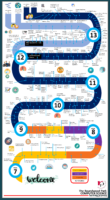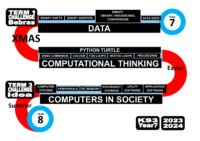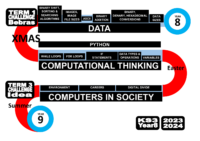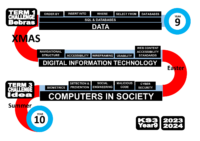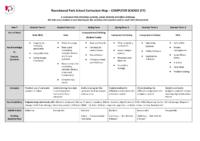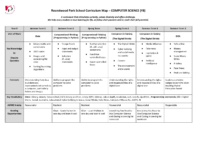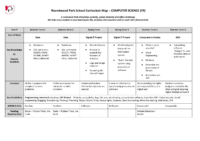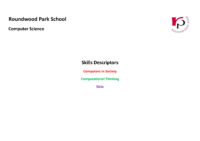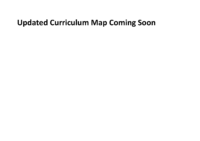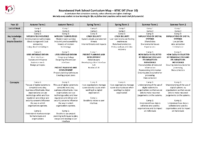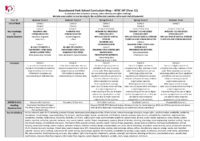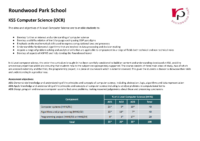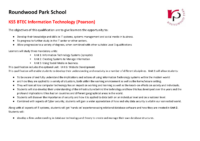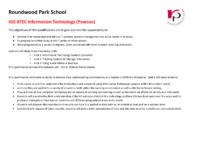Computer Science & IT
Within computer science we aim to give students the necessary skills and knowledge to help them thrive in the real world.
Over the past few years the Computer Science department has overhauled the curriculum to ensure that all students are given the opportunity to be successful in this new discipline. Embedding the ASPIRE skills in our schemes of learning, we ensure that students develop their creative problem solving, self-discipline and collaboration skills whilst taking risks in their learning.
Key Stage 3 (Years 7, 8 & 9)
In Years 7, 8 & 9 students are taught within their tutor groups for one hour per week. The curriculum has three themes that run across the three Years: Data, Computational Thinking and Computers in Society.
Data Representation is a topic that stretched across all 3 Years looking at how data such as images, sound and text are stored and represented on a computer. In Year 9, students start looking at how databases are structured and how to use SQL to create, query and modify them.
Computational Thinking. In Year 7, students begin their RPS programming journey by looking at Python Turtle. Year 8 builds on this knowledge, shifting students over to Python programming. In Year 9, students complete a DIT (Digital Information Technology) project allowing them to be better informed about their Computer Science GCSE and IT BTEC options.
Computers in Society looks at how computers work (Year 7), our rights and responsibilities as a digital user (Year 8) and Cyber Security (Year 9).
Each year at Key Stage 3 offers new material and enables students of all abilities to be stretched and challenged in an engaging and enriching environment.
Key Stage 4 GCSE (Years 10 & 11)
The new Pearson Edexcel GCSE Computer Science specification recognises the well-established methodologies of computing, alongside the technological advances which make it such a dynamic subject. Students will complete this course equipped with the logical and computational skills necessary to succeed at A Level, on a BTEC National, in the workplace and beyond, fully preparing students for the 21st Century.
Throughout the two years, students will draw upon the knowledge and skills gained in Key Stage 3 and further their study in the following 6 areas: Computational Thinking, Data, Computers, Networks, Issues and Impact and Problem solving with programming.
This course of study enables students to:
- build on their knowledge, understanding and skills established through the computer science elements of the programme of study at Key Stage 3
- enable students to progress into further learning and/or employment
- understand and apply the fundamental principles and concepts of computer science, including abstraction, decomposition, logic, algorithms and data representation
- analyse problems in computational terms through practical experience of solving such problems, including designing, writing and debugging programs
- think creatively, innovatively, analytically, logically and critically
- understand the components that make up digital systems and how they communicate with one another and with other systems
- understand the impacts of digital technology to the individual and to wider society
- apply mathematical skills relevant to computer science
Key Stage 4 BTEC Digital Information Technology (DIT)
(Years 10 & 11)
Students will learn how to design and create a Graphical User Interface (GUI) for a theme park’s Digital Information Point. As part of this, they will become aware of how GUIs are used, how they are developed and how they cater for a range of needs and accessibility options. Students will also learn how and why testing and obtaining feedback is an important part in the development process of designing digital based solutions. (Component 1 – coursework assignment).
Students will find out about and experience how data is collected by an organisation and will discover the different methods of data collection, and see how Social Media can play an important part in how data can be gathered. Building upon this, students will experience how data is used and how it can be presented as useful information in different visual formats. (Component 2 – coursework assignment).
Finally, students will discover how current technologies have a major impact on our lives. They will explore how technology is used in many different environments such as business, leisure, safety, retail, Internet, health and education. Significantly, they will also find out why and how cyber security plays a vital role in our digital world. (Component 3 – written exam).
Key Stage 5 A Level (Years 12 & 13)
In Sixth Form we offer two courses, OCR A Level in Computer Science and BTEC in Information Technology.
OCR A Level
The A Level Computer Science qualification helps students understand the core academic principles of computer science. Classroom learning is transferred into creating real-world systems through the creation of an independent programming project. The A Level will develop the student’s technical understanding and their ability to analyse and solve problems using computational thinking.
Students will take part in three components of the OCR A Level in Computer Science.
Two parts are assessed through written examinations. The first is in Computer Systems, which focuses on Components of a Computer, Data Exchange, Software Development, Data Types and Legal and Ethical Issues; the second is in Algorithms and Programming which focuses on using Computational Thinking to solve problems; the third component is the Programming Project. Students will be expected to analyse a problem, design, develop and test their solution and evaluate it. Previous projects have included arcade games, physics simulations and educational learning tools.
BTEC in Information Technology
The Extended Certificate in Information Technology consists of four units. Units 1 and 2 are examination units and Unit 3 and Unit 6* are coursework based.
Unit 1 focuses on the use of Computer Systems in the work place. Students will be expected to apply their knowledge to a business context. Unit 2 is a practical examination in which students will be expected to design, build, test and evaluate a relational database. In Unit 3 students will investigate the usage and impact of social media in a business context and how it can be used to drive user engagement, promote brand awareness and build stronger relationships with existing customers. In this unit students will be expected to research the impact of social media through academic articles and will be expected to cite and reference their wider reading in their assignments using the Harvard Referencing format. They will also be expected to plan and design a social media campaign, develop their ideas and optimise their content, and evaluate the effectiveness of their campaign. Finally, Unit 6 requires students to investigate the effectiveness of two websites for a given purpose and to build a website for a client. In this project students will again be expected to plan and design their website, develop it using HTML, CSS and Javascript and optimise it based on feedback from their client.
The BTEC in Information Technology is an exciting, enriching and engaging course and through the carefully tailored curriculum, learners build their vocational skills that will enable them to transition directly into the work place or on to Higher Education.
Previous students from both the A Level and BTEC courses have successfully secured degree apprenticeships in Fortune 500 companies.
